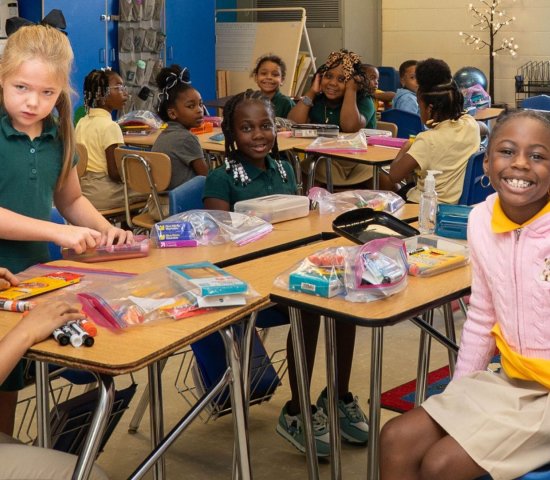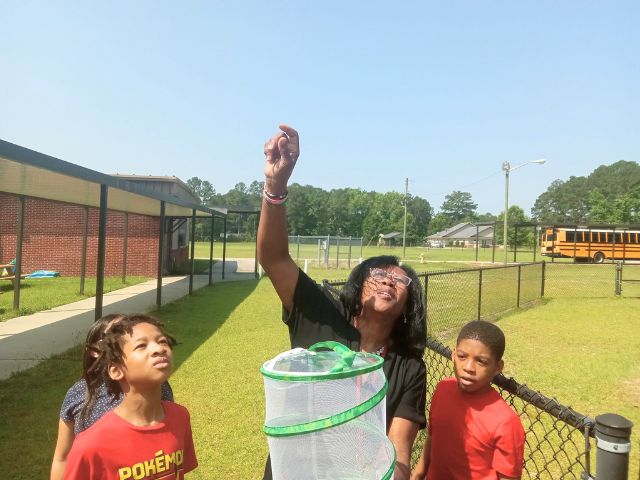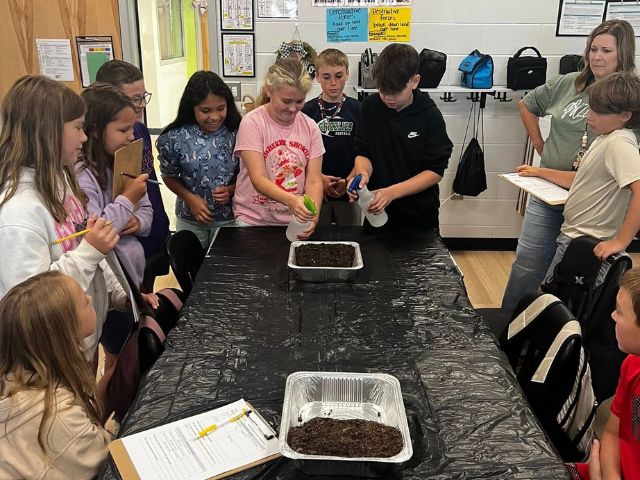
The Environmental Education Initiative today announced the five 2025-2026 recipients of The National Environmental Education Foundation (NEEF) Greening STEM Grant. The Environmental Education Initiative by Discovery Education with NEEF and other partners is a first-of-its-kind program designed to engage students in environmental science, empower them to make informed decisions for healthy environments, and promote civic engagement. Discovery Education is the maker of essential PreK-12 learning solutions used in classrooms around the world.
Earlier this year, NEEF partnered with Discovery Education and the Environmental Education Initiative (EEI) to provide funding for select Greening STEM projects from Discovery’s network of educators. This funding will support holistic STEM programs that infuse environmental science and resources into school curricula focused on student-directed investigations of relevant topics of research, local environmental issues, or problems affecting local public lands.
The Greening STEM Grants support programs that infuse environmental science and resources into school curriculum focused on student-directed investigations of relevant topics of research, local environmental issues, or issues impacting local public lands.
“Through these Environmental Education Initiative Greening STEM grants, we seek to challenge formal and nonformal educators to design and deliver STEM programming that engages youth in place-based learning,” said Robert Sendrey, program director for environmental education at NEEF. “We also hope to empower educators to build a culture that values using the environment as a context for improving student learning and achievement.”
Projects that actively involved students in citizen/community science or environmental monitoring during the 2025–2026 school year were especially highlighted, reflecting the value of experiential, place-based STEM education. The following projects have been selected to receive up to $7,000 each in STEM grant funding:
Growing Green
Fairfield County School District in Winnsboro, South Carolina
The "Growing Green" project is a student-led greenhouse initiative in Winnsboro, South Carolina, focused on hands-on environmental STEM learning for Grades 5-6. The project involves 80 students and aims to enhance 21st-century skills through immersive learning of earth and life sciences. Instructional strategies integrate Greening STEM methods, including project-based and community-based approaches. Project partners include Fairfield Career and Technology Center, Sandhill Research and Education Center, and various other stakeholders.
Exploring Earth & Beyond: Connecting Local Learning to the Cosmos
Fairfield County School District in Winnsboro, South Carolina
During this interdisciplinary project for Grades 5-6, approximately 100 students will explore concepts related to Earth’s place in the universe, light and shadows, and gravitational force through place-based investigations, moon phase journals, digital and 3D scale model building, and interactive science labs using real data. The project will culminate with a field trip to the South Carolina State Museum Planetarium in Columbia, South Carolina, where students will participate in a full-dome immersive planetarium show and interact with museum exhibits that reinforce classroom learning. Partners include the South Carolina State Museum Planetarium, local STEM professionals, and community members.
School Garden
R.E. Davis College Preparatory Academy in Sumter, South Carolina
This project involves a school garden initiative that integrates STEM classes and an after-school gardening club. The anticipated impact includes teaching over 20 students gardening skills in small spaces. Instructional strategies involve student involvement, community support, and curriculum integration, including project-based learning and the use of a Garden STEM science curriculum. Local partners like the Clemson University Cooperative Extension and Sumter County Master Gardeners Association will support gardening projects and educational activities. Additionally, the project will task students with designing robots that could help improve classroom learning while enhancing productivity in the school garden.

Bengal Biodiesel
Blythewood High School, Richland School District Two in Blythewood, South Carolina
The Bengal Biodiesel program at Blythewood High School recycles cooking oil into biodiesel for school transport and produces hand soap from glycerin waste. Funding for this project will help expand the existing biodiesel program while partnering with organizations for student learning experiences and training students to become leaders in sustainability. Approximately 40 students will gain marketable skills and over 100 hours of hands-on experience through the program, which involves producing biodiesel for school buses. The program has partnered with organizations such as the Palmetto Clean Fuels Coalition, South Carolina Energy Office, and Green Energy Biofuel to provide internships, industry-standard procedures, and audits to enhance the student experience.
Free Home Green Team
Free Home Elementary School in Canton, Georgia
The “Free Home Green Team” project at Free Home Elementary School aims to implement a Greening STEM project involving school-wide recycling and STEM activities to reduce their carbon footprint, expand existing STEM programs, and engage 300 students in real-time environmental impact awareness. The project includes instructional strategies focusing on real-world conservation, data collection, and hands-on experiences with the school’s STEM Cart, which has developmentally appropriate STEM games and activity kits for each grade level. Project partners include Free Home Elementary’s Green School Coordinator—who is responsible for showing students which materials are acceptable to recycle at bins located around campus—and the local PTA, which will help achieve project goals of reducing plastic use, lowering energy costs, and increasing community engagement.

The funding recipients were selected from among the members of the Discovery Educator Network, or DEN. A global community of education professionals, the DEN connects members across school systems and around the world through social media, virtual conferences, and in-person events, fostering valuable idea sharing and inspiration. This year, the DEN is celebrating 20 years of connecting educators to their most valuable resource: each other.
“Research shows that students thrive when classroom lessons are engaging and connected to the broader world. These real-world connections not only strengthen critical thinking but also boost academic achievement. We’re proud to celebrate each of the STEM Grant recipients for their innovative work in expanding the learning beyond the classroom,” said Catherine Dunlop, Senior Vice President of Corporate Partnerships at Discovery Education. “Together with NEEF, we’re excited to support these transformative projects and watch them come to life.”
For more information about Discovery Education’s award-winning digital resources and professional learning solutions, visit www.discoveryeducation.com, and stay connected with Discovery Education on social media through LinkedIn, Instagram, TikTok, and Facebook.
To access Environmental Education Initiative resources, visit environmentaleducationinitiative.discoveryeducation.com. Users of Discovery Education Experience can find these resources on the Environmental Education Initiative channel.